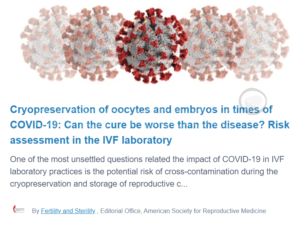Authors:
Nuno Costa-Borges, Ph.D.1, Mònica Acacio, M.Sc.1, Ivette Vanrell, M.Sc.1, Gloria Calderón, Ph.D.1
1Embryotools, Parc Cientific de Barcelona
Consider This:
Since the state of alarm was decreed in Spain due to the COVID-19 pandemic, we have gone through an initial skepticism phase that was then followed by the temporary cessation of all activities in the IVF laboratories, similarly to what happened in most European countries. During this period, the different national and international Scientific Societies have prepared guidelines with instructions for reproductive centers, which have been prepared on the basis of the available knowledge about the virus (1-3). These recommendations have been updated regularly and contributed to the evaluation of the possible risks of transmission of SARS-CoV-2 to reproductive cells and have helped IVF centers to implement preventive measures. Similarly, governmental agencies such as FDA in the US that regulate use of donor gametes or embryos provided additional guidance for cases where heterologous material is used (4). However, recommendations of additional screening and testing of donors has been quite minimal. Now that many centers are returning to normal activities, there are still doubts in regard to specific laboratory procedures. In particular, one of the most unsettled questions is the potential risk of cross-contamination with SARS-CoV-2 during cryopreservation procedures or the storage of the reproductive cells in liquid or vapor phase nitrogen tanks. In this regard, we consider that it is important to evaluate carefully the pros and cons of each of the measures proposed to avoid unnecessary risks.

